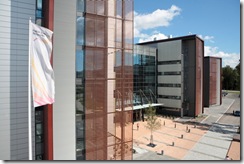Nokia Siemens Networks’ (NSN) desire to increase market share and succeed remains undeterred. Jorg Erlemeier and other members of his senior management team in the Middle East detail the company’s action plan for sustainable growth
According to Erlemeier, the integration process of former Motorola Networks staff into NSN’s operations has already occurred to all intents and purposes
The Middle East region was separated operationally from Africa at the beginning of 2011, in a bid for Nokia Siemens Networks to be able to focus effectively on the trends, threats, and opportunities facing the region in a standalone context, says Jorg Erlemeier, NSN’s head of Middle East region.
“There were logistical challenges in trying to cater to the needs of a geographic region the size of Middle East and Africa,” Erlemeier says. “Both from a resourcing perspective as well as addressing the different stages of development in various regions, so a decision was taken to focus on them separately.”
NSN officially commenced operations as a standalone entity in April 2007 and since then has been the focus of immense media and analyst interest, with respect to its medium- to long-term prospects. Its two parent companies – Nokia and Siemens – see their initial partnership agreement expire in 2013, a date that is considered significant in cementing NSN’s long-term future.
Earlier this month, two private equity groups were reported to have dropped out of the bidding to buy a stake in NSN after disagreements about the price and degree of control the investors would receive over the vendor.
Citing several people close to the situation, the Financial Times reported that there was now just one bidder left that might take a stake in the infrastructure vendor.
It is understood that neither Nokia nor Siemens is actively seeking a buyer, and operationally NSN continues to look to make significant inroads in maintaining its position as a leading global equipment manufacturer.
At the end of April NSN and Motorola Solutions jointly announced that NSN had completed its acquisition of Motorola Networks assets, paying US$975 million in cash. As of April 30 2011, responsibility for supporting customers of Motorola Networks’ GSM, CDMA, WCDMA, WiMAX and LTE products and services transferred to NSN.
According to Erlemeier, the integration process of former Motorola Networks staff into NSN’s operations has already occurred to all intents and purposes, and NSN is actively engaged in the contracts brought over from Motorola. On its own NSN’s Middle East office counts approximately 400 employees brought over from Motorola.
“We did not have CDMA and WiMAX activities in our portfolio, and now we do. We have also gained access to more customers and activities, particularly in North America, Japan, and China,” says Erlemeier.
In the Middle East, NSN faces fierce competition, and despite the overall company reporting its third consecutive quarter of growth in Q111 to end-March, the regional perspective was tighter. Middle East and Africa recorded a three per cent increase in sales year-on-year in Q111, the slowest growth rate of any of NSN’s regions aside from Europe, which recorded a six per cent decline in sales year-on-year during the period.
“We have suffered from a delayed impact of the financial crisis,” Erlemeier says, explaining the modest year-on-year growth in the Middle East, Africa region in Q1. “Access to funds (by network operators) in Africa had been tightened, but we can see more willingness to invest, and I believe we are back on the right track.”
NSN reported gross profit increased eight per cent to €847 million (US$1.22 billion) in Q111, with an operating loss of €142 million, down from a reported operating loss of €226 million in Q110, and operating profit of €1 million in Q410.
NSN Middle East operations incorporate 3,200 employees, 18 countries, and 59 active customers at the end of May 2011, where the company views mobile broadband and managed services as strong areas for further development.
Broadband subscribers in the region are rising rapidly, admittedly from a low base, but Erlemeier and his management team see lots of room for growth, evidence of which is in the fact that six of NSN’s 37 commercial LTE deals are situated in the Middle East. 
NSN counts 65,000 employees worldwide, and has developed a value system and culture of its own. 45,000 staff members work in areas related to services
NSN has identified three main trends in the region to help guide its resourcing priorities and focus areas:
Trend 1
An ever-increasing demand for data, which Erlemeier describes as an impending data tornado. It is estimated that the data transfer of the equivalent of 6.3 billion digital books will be downloaded worldwide everyday by 2015.
“Between 2003 and 2010 we have witnessed the commoditisation of the network,” Erlemeier says. “I would describe the years to come as the decade of the network, where the customer experience is the focus and information will be held in the network,” he adds.
Erlemeier predicts network providers will need to develop two-faced business models, given that while bit pipe investments continue to be necessary, operators would also need to cope with a challenge from companies that want to “eat network providers’ lunch” when it comes to monetising data services.
Trend 2
The customer experience becomes the key element, which is a positive development for customer service providers, given that they are well-trusted by end-users.
Trend 3
Transformational agility with respect to NSN helping customer service providers to turn their businesses into customer oriented activities, helping develop technology leadership, and investing in the right ingredients to stay ahead of the competition.
For example, in May NSN entered an agreement with Saudi Arabian telecom specialists, Al Sarya Telecommunications Company and Belal Company, to form a joint-venture to expand its business in the kingdom.
The joint venture company, which will be called Nokia Siemens Networks Al Saudia Ltd, will combine the local knowledge of Al Sarya Telecommunications Company and Belal Company with the scale and expertise of NSN to tap growth opportunities in Saudi Arabia.
The joint venture will complement and not replace NSN’s existing business in Saudi Arabia, focusing on service delivery and implementation. NSN’s Saudi office will focus on sales of equipment and services.
Under the terms of the deal, the joint venture will offer operators services in four main areas comprising: network implementation; business solutions; managed services; and hardware and software maintenance.
The new venture is being led by executive director Ali Damiri, who previously headed up NSN for Saudi, the Levant and Iran sub-region, covering six countries.
Al Sarya Telecommunications Company and Belal Company are both members of the Ghazzawi Group of companies.
“NSN is focussed on working on R&D in advance,” Erlemeier says. “The extension of the life-cycle of customers is the aim, through the mixing of solutions. Operators are in a battle to protect their installed bases, and this is where we are able to offer significant assistance.”





0 comments ↓
There are no comments yet...Kick things off by filling out the form below.
Leave a Comment